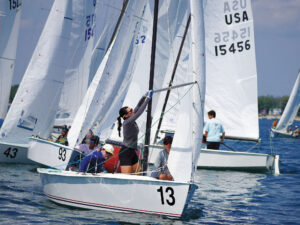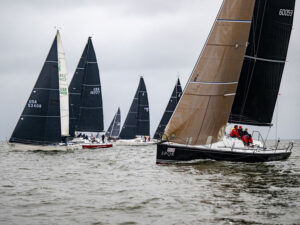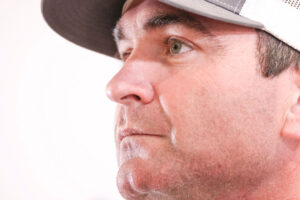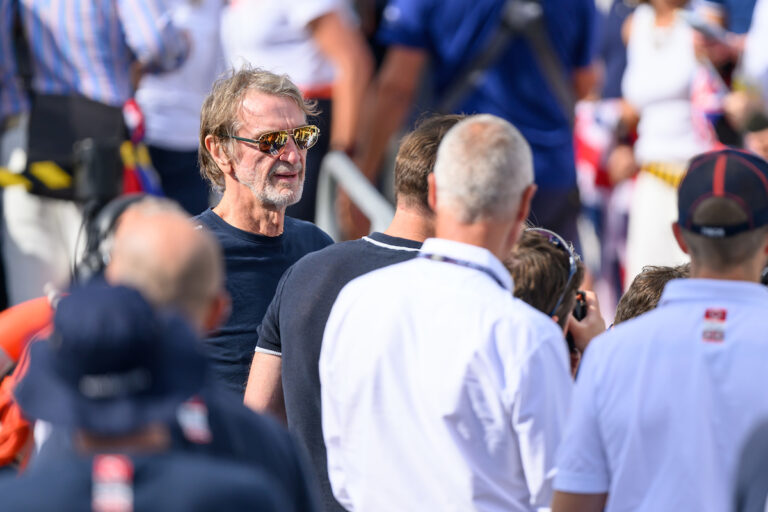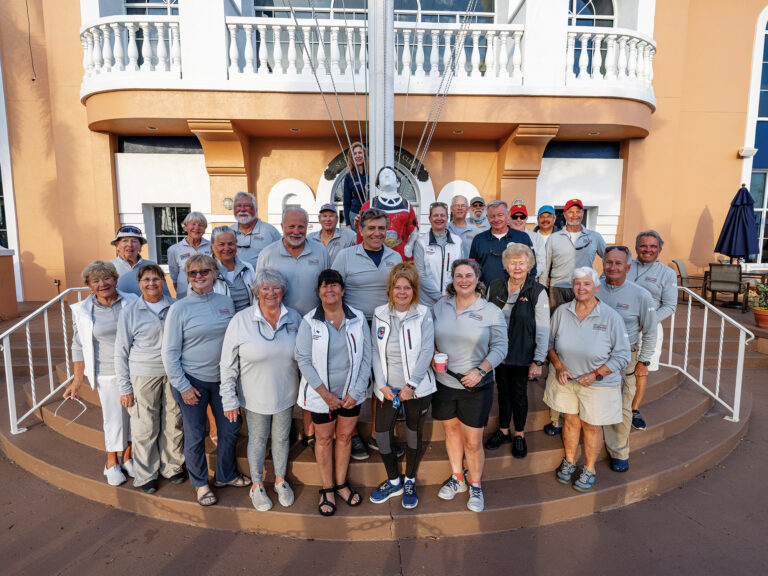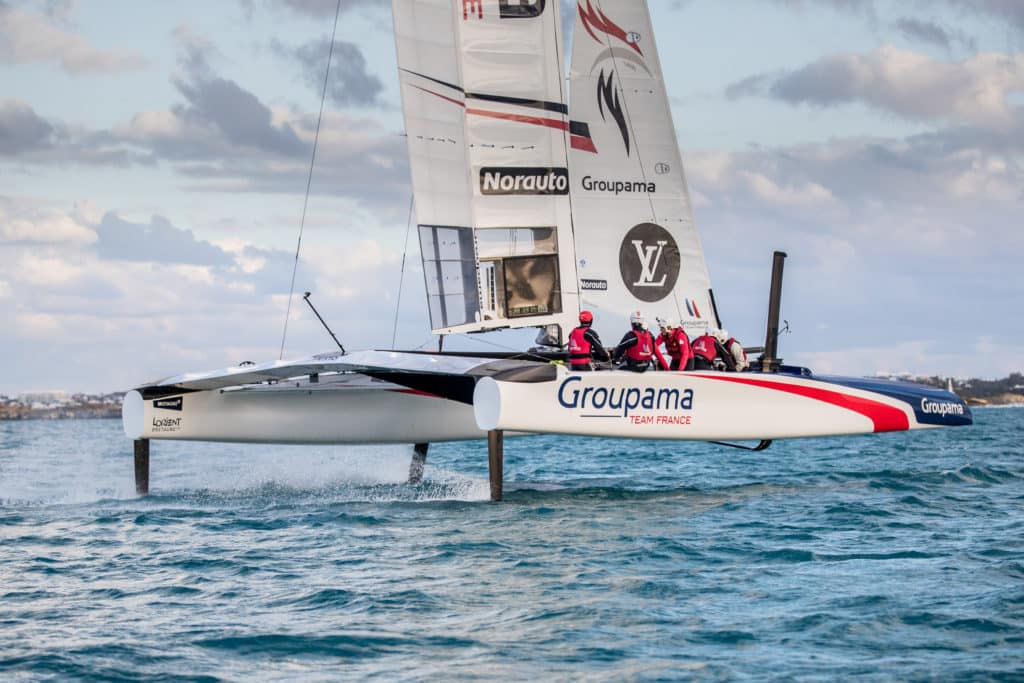
Franck Cammas has just finished his early-morning workout and is looking forward to a proper French-fare breakfast. He’s thinking about the violent storm that’s pounding his team’s base, more than 3,000 miles away in Lorient, France. On this particular day in Bermuda, however, the weather is fine. It’s balmy where he and his Groupama Team France teammates have only recently relocated as they await the arrival of their AC50 and all the containers that come with it.
Today, Bermuda is certainly the better place to be. But the thought of weather in France is merely passing; more pressing is the buildup to what he and his team will face in a matter of weeks.
The underfunded and understaffed Groupama squad will enter the first official race of the Louis Vuitton qualifiers — against the America’s Cup defender, Oracle Team USA. It doesn’t seem quite fair to be pitted against the regatta’s bulldog so early in the regatta, but Cammas is pragmatic despite his team’s place in the basement of the America’s Cup World Series standings.
The odds are obviously long indeed, yet the French team has all to gain and nothing to lose.
“Against Oracle, there could be some surprises in store,” says Cammas. “But we also realize we have only a few weeks to prepare, so there will be no room for error.”
Waiting for their boat, and observing other teams, especially Land Rover BAR, in Bermuda, has been beneficial, says Cammas.
“Oracle is the reference by which we have measured ourselves,” he says. “They certainly have a faster boat and a crew that can do the maneuvers better since they have had more time to practice. But we have been watching how they do certain things, which we can learn how to do better.”
Cammas’ cautiously optimistic attitude is an uncharacteristic facade. In France especially, his reputation is that of combative, demanding and, quite often, controversial skipper. But his direct, results-focused management style is not something his sailors take personally. Instead, says Michel Desjoyeaux, a two-time Vendée Globe winner and Groupama’s ambassador, they see his intentions are to motivate them to perform better, in ways they might not have thought possible.
“Cammas is not really a difficult skipper because he wants the best for the boat and the team,” says Desjoyeaux. “If you agree with that, fine. But if you don’t think his way and decide to leave the team, that is not a problem for anybody.”
While Cammas may be the ultimate decider in this French campaign, he will heed alternative opinions. “The team retains its Latin culture,” says Desjoyeaux. “This means there is room for everyone to express their points of view. Franck listens, then he decides — he doesn’t just make decisions and everybody else follows.”
But one better have a solid case should one question Cammas’ intentions. “Sure, Franck will enter into a tactical debate with you. But let’s just say you better be ready to give everything you’ve got to defend yourself,” says Groupama team member Olivier Herledant. “And if he does not think you are performing the way you should be, he is going to let you know.”
Cammas’ personality has taken him a long way, and there should be little surprise that he’s been tasked with leading this all-French effort. After growing up in a trailer without running water, he mustered the discipline to enter France’s elite Mathématiques Supérieures high school, one of his hardest-won battles, he says. There, his rigorous studies in math and physics gave him the capacity to dive deep into the technologies of the modern America’s Cup boats — the stuff best left to experienced engineers and designers.
As a professional sailor, Cammas was also not a pre-race favorite before winning the Route du Rhum in 2010 or the Volvo Ocean Race for the French team as a skipper in 2012. Should he follow form — and there’s no reason to believe he won’t — there’s all the more reason for his competitors to be wary and take the challenge seriously.
“People wonder just who these French guys are and what they are doing in the America’s Cup, but trust me, Franck doesn’t care about what people say or think,” says Desjoyeaux. “At the beginning of the Volvo Race, the Kiwis said the Volvo was not a Frenchman’s race. ‘Go back home, Frenchie,’ they said. But you know how that story ended.”
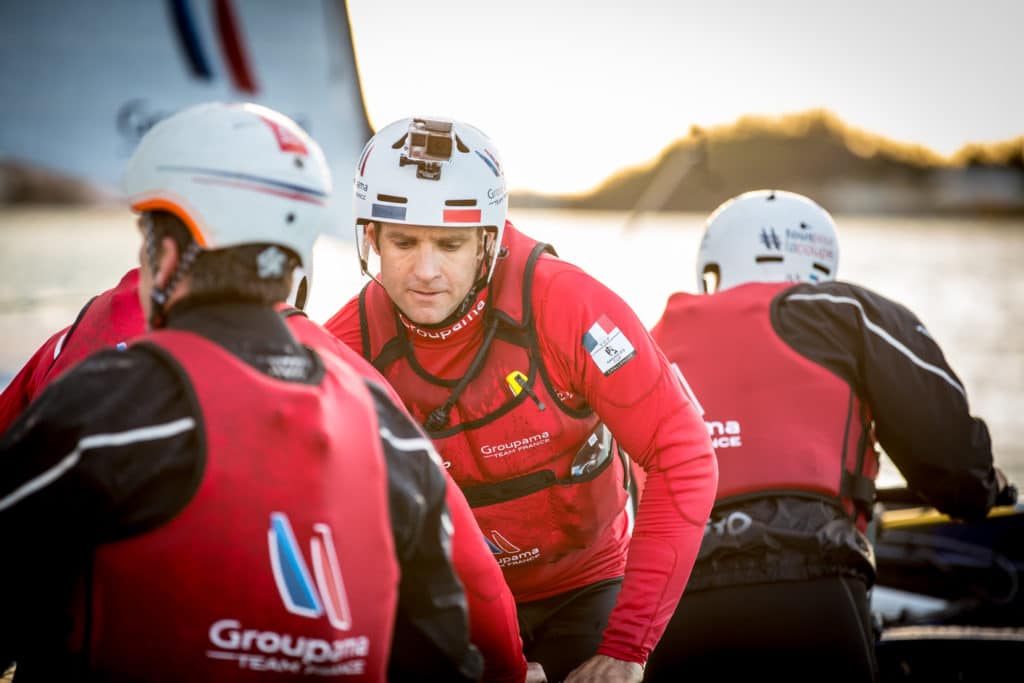
Now, in Bermuda, Cammas and his team are attempting to master Groupama’s new America’s Cup Class catamaran, and among other things, how to sail on the boat’s foils from start to finish in a race. A key challenge with the ACC design in particular is successfully completing a foiling tack. By May, Cammas and his team will have had only a few weeks to master the complex three-dimensional dynamics of the hydraulics, boards, grinding and wing adjustment while foiling. They also must be able to do this, of course, in the narrow confines of Bermuda’s Great Sound.
As of March, Groupama had yet to successfully complete a foiling tack in one week’s time since its ACC boat was ready in March. This was after several weeks since late fall, when the team began to study how the other teams foiled on their ACC boats, with a focus on how Oracle and Land Rover mastered the maneuver. But actually applying what they learned by watching has been a different story on their boat. The foil’s position in the water, grinding power, and trimming the wing must be done exactly right, which, to say the least, is very challenging, says Herledant.
“We are eventually going to get there, but the maneuver is incredibly difficult,” he says. “Winning will require a complete mastery of foiling, whether you are tacking, jibing, or sailing in a straight line. And if you want to win, doing all of that well is just a prerequisite.”
Instead of two or three practice boats, Groupama had only one. Its ACC boat is a refurbished version of its practice boat, with which it shares 90 percent of the same components. While the team’s ACC boat was being built in France, the team could watch the other teams practice on ACC-ready boats only between December 2016 and March 2017.
Aside from a relatively small budget, Groupama also suffered a major setback in December 2015, when Cammas’ foot was nearly severed when he fell from the helm of the team’s GC32 during a training session off the coast of Quiberon. In the aftermath of the accident, Cammas had to remain shore-bound and was unable to sail with the team until spring 2016 Cammas, however, says he was able to make the most of this major setback by using the downtime to work more closely with engineers on the team’s AC boat, with extra attention paid to its hydraulics system and foil design. In the immediate future, given the short time the team will have had to train on their boat leading up to the first race against Oracle in May, Cammas says he will opt for stability over speed. He will thus use larger foils instead of smaller and faster but more-unstable foils.
“If we had more time to train, we would probably have been able to use a less-stable foil combination for more speed,” says Cammas. “We will have only about two months to prepare, so we will lean toward the most stability.”
The very existence of the French team’s campaign is also a reflection of the radical changes the America’s Cup has undergone. With the more-affordable one-design platform package, Groupama will compete on a budget of 30 million euros. While admiring the technologies the AC72 introduced, and to a lesser degree, its sheer size and speed, the scale and cost of taking part in the last America’s Cup was prohibitive for a French team, says Desjoyeaux. “I am certain we would not have been able to compete if the last design rules had not changed,” he says. “The cost and barriers of entry would have been too high.”
The predominantly French team, however, is not a pastiche country squad that has struggled to put together a first-and-last campaign. In fact, Desjoyeaux says this is the first of more to come. And as far as a talent pool goes, France certainly has some of the world’s best sailors, although they mainly stand out in offshore contests and ocean record passages.
The French have also been a good source of talent for recent America’s Cup teams. Loick Peyron, for example, served as a helmsman for Alinghi during the last two America’s Cups and serves in a key performance and coaching role with Artemis Racing. Philippe Presti, of course, has retained his role as the coach of Oracle after playing a decisive role in Oracle’s great comeback to win the 34th America’s Cup.
However, the French sailing team remains largely unknown, to the point that an outsider might even think the team is secretive and introverted. This is not intentional, however, but rather the result of a meager marketing budget. Even in France, where sailors in the offshore classics like the Vendée Globe and the Route du Rhum have celebrity status, Groupama’s America’s Cup campaign is largely unknown. For that to change, Groupama must show results, even in the short term.
“I am going to affirm that despite all of the challenges, it is our ambition to win the America’s Cup one day,” says Cammas. “We must do well to also instill interest back home. We have to be patient though. When we start doing well, of course, we are going to get more support from home.”
Groupama, nevertheless, remains the team with the smallest budget and the least amount of time to prepare for the great race, and whether they do well or not says Desjoyeaux, they will be better prepared for the America’s Cup in 2020.
And yes, Desjoyeaux is confident they will one day take the trophy to France, and the weather in Lorient will, of course, be fine.

